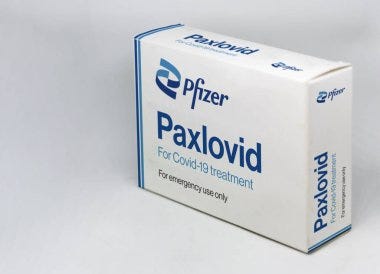COVID-19 is a dramatically different disease than it was in December, 2021 when the Food and Drug Administration (FDA) first issued an emergency use authorization for the drug Paxlovid (a combination of two antivirals, nirmatrelvir and ritonavir.) Paxlovid was formally approved by the FDA in May, 2023, and “commercialized” that year, when the federal government stopped purchasing it and employer sponsored health plans started providing coverage. COVID-19 wastewater concentrations are currently low, and the risk of death or serious illness from COVID for those who are not elderly or immunocompromised is dramatically lower than it was a few years ago.
Earlier studies showed that Paxlovid decreased hospitalization, mortality, and the risk of Long COVID. But antiviral agents sometimes lose their effectiveness as viruses mutate, and if the underlying danger of the virus diminishes, the net benefit of even an effective antiviral can fade.
A report in the New England Journal earlier this month randomized almost 1,300 patients who were either fully vaccinated with a risk factor for severe disease or had never been vaccinated; half got Paxlovid and the other half got placebo. Risk factors for severe disease include old age, obesity, smoking, diabetes, cancer, immunosuppression and chronic respiratory disease. Those in the study had an average age of 42, so this data is relevant to an employed population.
The researchers found that those who got Paxlovid had a slightly shorter duration of illness (12 days vs. 13 days for placebo). This did not reach statistical significance. While there were fewer COVID hospitalizations or deaths from any cause in the Paxlovid group (5 vs. 10 in the placebo group), this also did not reach statistical significance. This study did not definitively show that Paxlovid doesn’t decrease duration and complications from COVID-19. However, the study shows that Paxlovid is unlikely to make a big difference for these populations.
The research did not include unvaccinated people with any risk factors for severe disease, partially vaccinated people, or fully vaccinated people with more than a single risk factor. This study also did not address whether Paxlovid provided protection against Long COVID.
Paxlovid’s price is about $1,400 for a five day course.
Implications for employers:
Paxlovid is still appropriate treatment for some who are newly infected with COVID-19.
A prior authorization could delay therapy, and the drug is most effective if given soon after diagnosis, and only approved if given within 5 days of symptom onset.
Physicians were already prescribing Paxlovid less often than predicted, so this finding will not likely lead to large cost savings.
This study demonstrates the value of continuing to monitor effectiveness of treatments even if they were initially shown to be highly effective.
Thanks for reading. You can find previous posts in the Employer Coverage archive
Please subscribe, “like” and suggest this newsletter to friends and colleagues. Thanks!
Tomorrow: The increasing toll of alcohol use disorder

